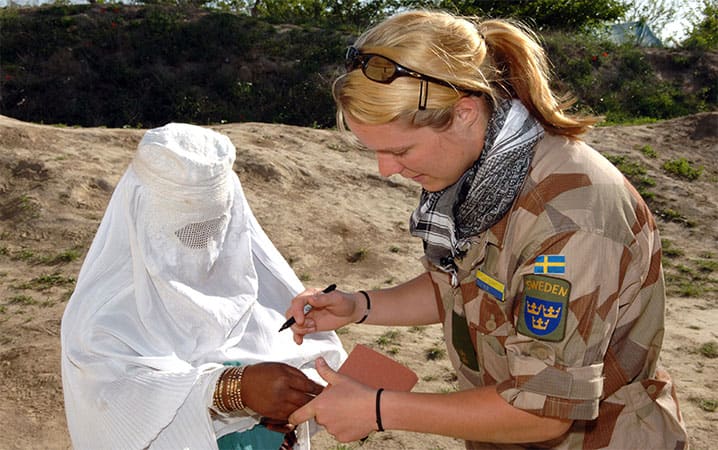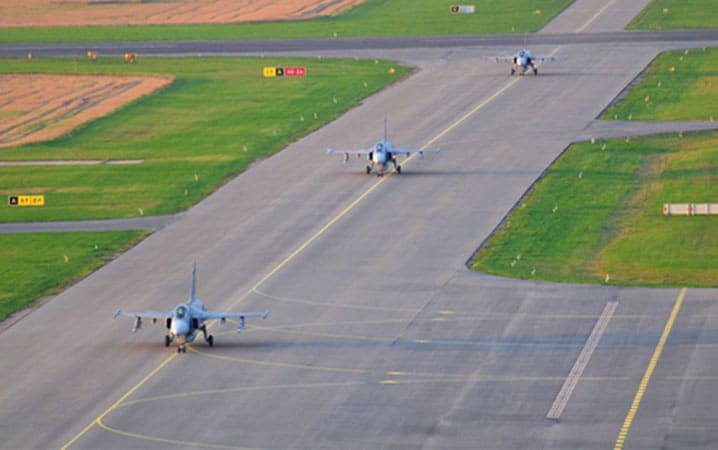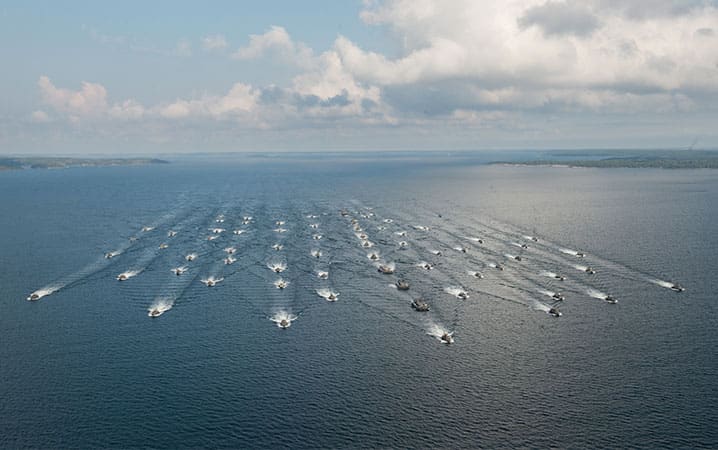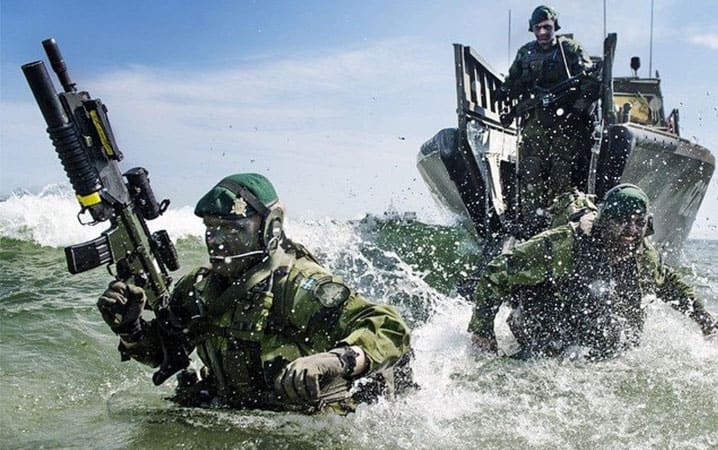After twenty years of cooperation with NATO, starting with the Partnership for Peace back in 1994, Sweden was one of five partners granted enhanced opportunities for dialogue and cooperation at the Wales Summit in 2014, my first as Swedish ambassador to NATO. The status of Enhanced Opportunities Partner provided a platform for developing a more flexible and individualised relationship, in addition to other partner formats. It coincided with Russia’s illegal annexation of Crimea and military intervention in Eastern Ukraine, and also with our defence bill for 2016-2020. Both the need to review our own defence policy and the dramatic signal that a European country was prepared to violate the existing security order using military might, gave momentum to the new partner platform.
Rebalancing our national defence
In Sweden, like in most European countries, the developments in 2014 brought defence and security policy back to the top of the political agenda. The end of the Cold War had given birth to the notion that eternal peace was here and the following decades were characterised by less focus on national defence. The absence of clear threats to our national security made us gradually abandon our previous concept of a strong national defence designed to prevent and avert a possible full-scale invasion. Consecutive governments cut back on defence budgets. The priority became first and foremost contributions to international missions, aiming to stabilise Europe and its neighbourhood. A transition took place, resulting in a leaner and meaner version of national defence with a particular focus on expeditionary forces.

A Swedish liaison officer serves as part of the NATO-led International Security Assistance Force in Afghanistan, which ended its mission in December 2014. © Swedish Ministry of Defence
Presently our biggest international military contribution is to Mali (MINUSMA). Over time more than 80,000 Swedish men and women have served in UN, EU, NATO and other peace-support missions around the world. Sweden has been part of all NATO-led missions under a UN-mandate and is still actively supporting the Kosovo Force in the Western Balkans and the Resolute Support Mission to train, advise and assist national security forces and institutions in Afghanistan. This has been instrumental in building interoperability between the Swedish Armed Forces and international partners but should also be seen as an act of international solidarity.
After the Cold War era (1949-1989) and the following decades of NATO focusing on international crisis management missions, our new status as Enhanced Opportunities Partner also coincided with the decision by NATO to adapt and refocus, to reflect the new realities. The deteriorating security environment and the need for NATO to focus on collective defence and the defence of Europe, underlined our mutual interest of working even closer together. The need to view the Baltic Sea region as one strategic area became a natural driving force for our broadened cooperation.
Sweden identified three areas of priority: political consultations, exercises and information sharing. Over the last three years, we have covered a lot of ground in all of these. At the Warsaw Summit in 2016, NATO emphasised the need to develop regular political consultations, shared situational awareness and joint exercises with Finland and Sweden. It has been both educational and rewarding to work with colleagues from the Allied countries and the NATO staff in furthering this agenda.
Challenges to the world order
Our common challenges are greater and more complex than in decades. Regional powers and non-state actors are testing their strength against neighbours, other states, and international institutions. The threats are manifold and more complex. Military readiness and capabilities will continue to be of vital importance but will not suffice in responding to terrorist, cyber or hybrid threats. These can only be addressed through more international cooperation, not less.
In this regard, it is encouraging to note the recent steps forward in NATO-EU cooperation. Sweden was among the EU member states declaring their intentions to join the new Permanent Structured Cooperation (PESCO) – a treaty-based framework and process to deepen cooperation on security and defence within the European Union among those members who are capable and willing to do so. The European Union, NATO and the United States, together with global partners, must continue to stand up for a world order based on international law and respect for human rights. A strong transatlantic link is important for the stability of NATO and Europe. By acting together in international fora, operations and exercises, we raise the threshold against aggression.
Along with the UN Charter, the principles and commitments of the Organization for Security and Co-operation in Europe (OSCE) constitute the normative foundation for European security. A key element in this is the right of all states to territorial integrity and to make their own security policy choices, including the principle that national borders may not be changed by use of force. Sweden welcomes the European Deterrence Initiative by the United States as well as the increased NATO presence in the Baltic Sea region, which contribute to regional stability as a whole. Sweden’s response to Russia’s aggressive military posture and unpredictable actions encompass strengthened national defence and increased security cooperation. Combined with active diplomacy through dialogue, this offers an opportunity to reiterate our continued support for international law, democratic values and principles.
Swedish defence policy in transformation
Our national security is our main responsibility and is directly linked to peace and stability in northern Europe. This year, the Swedish government adopted a National Security Strategy, a framework document defining national interests and threats in various fields. Swedish defence policy focuses on two parts: to upgrade national military capability and to deepen cooperation with other nations and organisations. This policy has broad parliamentary support.

Sweden is investing in new capabilities including a new generation of Gripen fighters. Photo Courtesy of Luftstridsskolan and Forsvarsmakten
From 2015, we see a new trend in Swedish defence spending. The government decided then, for the first time in more than two decades, to increase defence spending by 11 per cent by 2020. The budget was further strengthened this year through a multi-party agreement bringing the total increase over the five years to 17 percent.
Sweden is currently engaged in building a network of defence cooperations. We have a special and longstanding relationship with Finland, also a militarily non-aligned nation and an Enhanced Opportunities Partner. Together we plan for joint actions in peacetime, as well as beyond. We work closely with the Nordic and Baltic countries as well as with Germany, Poland, the United Kingdom and the United States.
Conscription, capabilities, resilience
This year, the Swedish government decided to re-activate the national conscription system. Conscription for both women and men will start from the 1st of January 2018 and the plan is to enlist/enroll approximately 4000 recruits the first year.
Other examples of our priorities are the re-established military presence on the island of Gotland and increased training activities and exercises. Participating in NATO’s most advanced and complex exercises is instrumental in developing interoperability and preparing for possible future coordination with partner countries. Two next-generation submarines are under construction. Additional investments will be made in anti-submarine warfare capabilities. In the air defence area, we will continue investing in a new generation of Gripen fighters and recently the government decided to enter into a procurement process regarding the Patriot air defence system. A final decision on the acquisition is expected during 2018.
While the key priority in the defence bill is to enhance the warfighting capability of the Armed Forces, it also includes the objective of re-establishing a whole-of-government approach to security, building resilience in line with the seven baseline requirements adopted by NATO at the Warsaw Summit.
All these measures convey a message that we are taking security seriously.
Militarily non-aligned but not neutral
While still militarily non-aligned, Sweden is no longer aiming for neutrality in case of a conflict, as was the case during the Cold War. Back then our doctrine stated that we were non-aligned in peacetime with the purpose of maintaining neutrality in the case of war. With our membership of the European Union in 1995, the old neutrality doctrine became obsolete, notably with the signature in 2007 of the Lisbon Treaty and its Article 42.7 (which puts an obligation on EU members to assist and support with all means another member state under attack, in line with Article 51 in the UN Charter).

Sweden’s largest national military exercise in over 20 years, Aurora 17, took place from 11 to 29 September 2017. Pictured is an amphibious battalion moving in formation in Sweden’s southern archipelago, a key strategic location for the defence of the capital Stockholm.
© Swedish Armed Forces
In 2009, the Swedish parliament unanimously adopted a declaration of solidarity which has since formed part of our security policy doctrine. It reads “Sweden is not a member of any military alliance. Threats to peace and our security can best be averted collectively and in cooperation with other countries. It is impossible to imagine military conflicts in our region that would affect only one country. Sweden will not remain passive if another EU Member State or Nordic country suffers a disaster or an attack. We expect these countries to take similar action if Sweden is affected. Sweden should therefore be in a position to both give and receive military support.”
In 2016, the government adopted the bill on 'Memorandum of Understanding on Host Nation Support'. The aim of this MoU with NATO is to ensure that Sweden, as a host nation, can provide effective support for military activities on Swedish territory in connection with exercises, crises or military operations in Sweden and in our vicinity. In September this year, we conducted the national exercise Aurora, with participation from several European nations and the United States. This was the largest Swedish military exercise in over 20 years, involving almost 20,000 military personnel and over 40 agencies. Transparency was a guiding principle in planning and conducting the exercise. International observers, including Russia and Belarus, were invited in accordance with the Vienna Document (an agreement between OSCE participating states intended to implement confidence and security building measures).
Close partner but not a member
The positive assessment of our first years as an Enhanced Opportunities Partner has now resulted in an extension of this status for another three years. I am convinced that we can continue to develop our cooperation further. While based on mutual interests and shared values, we must also take into account political and military restrictions distinguishing partner and Allied nations. We are eager to consult with the Allies and NATO officials on possible next steps and priorities. Let me finally express our gratitude for the generous support extended to us by Allied colleagues as well as by NATO staff in furthering our partnership!

